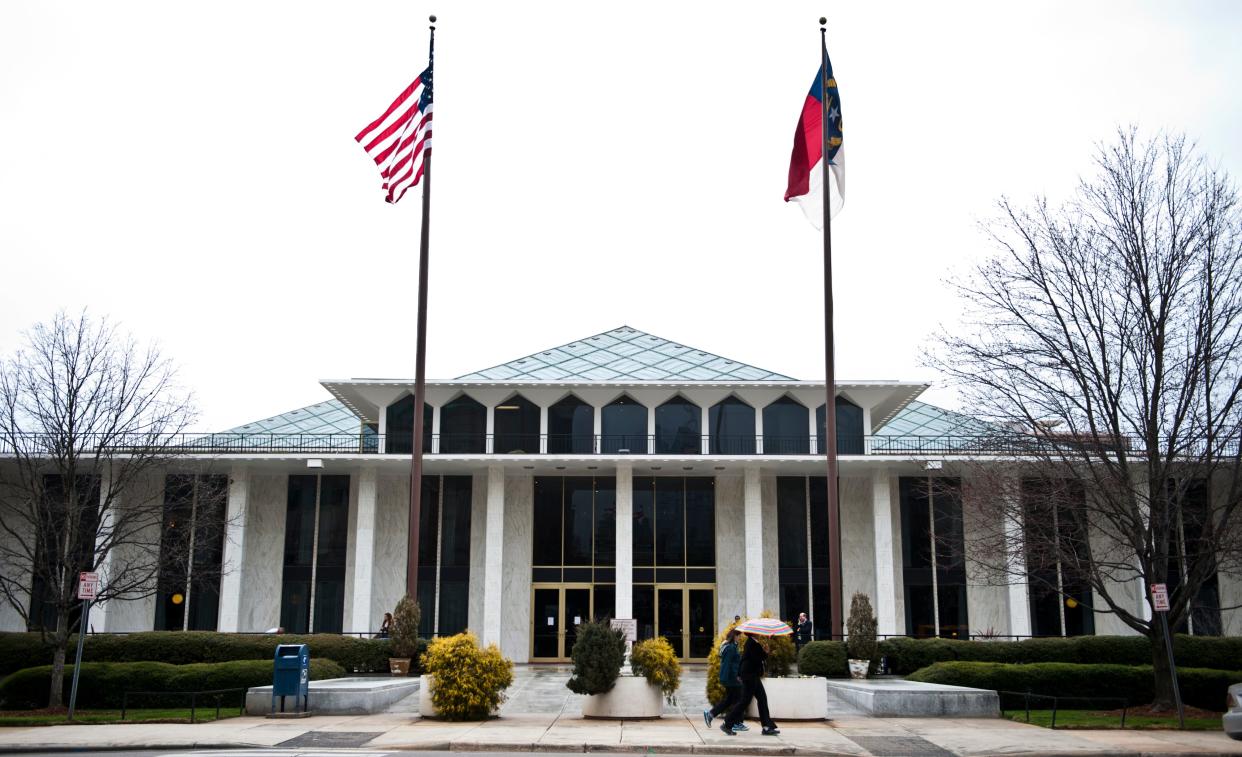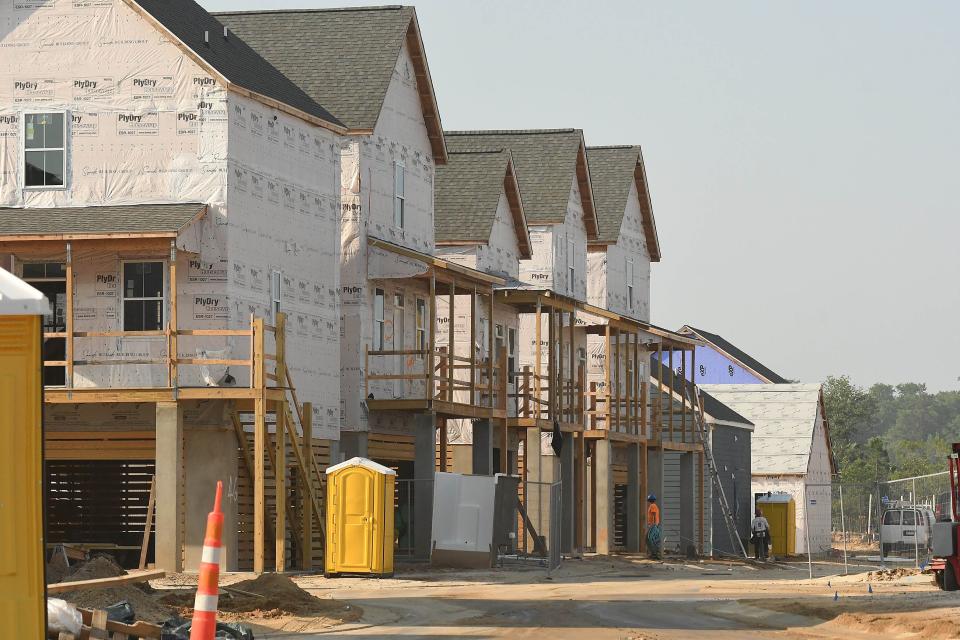As NC legislative session winds down, a look at 'green' bills and their potential impacts

- Oops!Something went wrong.Please try again later.
Wetland protections, where and how North Carolina should invest its tax dollars, and whether to set limits on "forever chemicals" are just some of the "green" issues that state legislators in Raleigh took up this year.
As the N.C. General Assembly nears its summer adjournment, here's a look at some of the bills the GOP-dominated legislature has passed that have impacts on the environment.
Several of the bills were rejected by Gov. Roy Cooper, but later saw them become law after Republicans used their supermajorities in both the N.C. House and Senate to override the governor's vetoes.
What is a wetland?
The 2023 version of the N.C. Farm Bill includes all kinds of provisions that impact agriculture and farming operations in the state. But it was a few lines regarding wetlands that raised alarm bells with environmentalists and many scientists.
Currently, wetlands that standalone from other waterways or are only wet for part of the year have state protection. But the U.S. Supreme Court ruled recently that only wetlands that have a surface connection to federally protected waters can have federal protection. While states can go above and beyond federal rules, language in the Farm Bill will see North Carolina follow the same rules as Washington.
WHEN IS A WETLAND NOT A WETLAND? North Carolina could loosen protections for isolated, 'dry' wetlands under new farm bill
State regulators have said up to half of North Carolina's wetlands, amounting to more than 2 million acres, could lose protection and be opened up to development. A large proportion of these isolated wetlands and pocosin areas, which are dry for much of the year, are in Eastern North Carolina, an area already susceptible to major flooding as seen during 2016's Hurricane Matthew and 2018's Hurricane Florence.
In his veto of the bill, Cooper said the bill “means more severe flooding for homes, roads and businesses and dirtier water for our people, particularly in Eastern North Carolina," adding that the language "reverses our progress” that have been made in recent years.
Supporters of the change said the role of isolated wetlands in improving water quality and reducing flooding has been overrated and current rules limit what property owners can do with their land.

Investment guidelines
House Bill 750 prevents state officials from taking into account a company's environmental, social and governance policies (ESG) when looking for investment opportunities or how it awards contracts or deals with employees.
The move adds North Carolina to a list of other GOP-led states that have banned the practice over concerns the requirements harms a state's ability to get the best return on its investments for retirees and taxpayers. It's also seen as a way for conservatives to counter growing liberal pressure on big corporations to factor climate change, sustainability and diversity into their business practices.
Like the Farm Bill, the legislation was vetoed by Cooper, but then overridden by the General Assembly.
“This bill does exactly what it claims to stop," Cooper said when he announced his veto. "For political reasons only, it unnecessarily limits the Treasurer’s ability to make decisions based on the best interest of state retirees and the fiscal health of the retirement fund.”
The bill was supported by N.C. Treasurer Dale Folwell, who is running for the Republican nomination for governor.
Measuring pollution
Environmentalists say language in House Bill 600, also known as the regulatory reform act, would weaken the state's ability to protect water quality by limiting officials ability to regulate how much chemical waste an industry or project can discharge into state waterways.
Tweaks to the bill last week appeared to remove some of those concerns, but not all.

LINGERING DOUBTS Falling through the cracks: As Congress looks to address PFAS, some are getting left behind
Supporters of the bill's language have said they don't want the state to regulate these chemicals more than the federal government, which has so far adopted few to no standards for "forever chemicals." They also said they are willing to work with stakeholders on reaching a balance between protecting businesses from having to incur additional costs and bureaucratic red tape and the need to safeguard the environment.
Among those who have expressed alarm about the proposal is the N.C. Department of Environmental Quality. Also vocally opposed to the bill is the Southern Environmental Law Center, which called the original proposal a "pollluters' wish list."
Last week's actions removed a provision that would have limited regulators' ability to keep contaminants out of waterways that serve as sources for public water systems. But another amendment to increase state oversight of the release of "forever chemicals," including GenX, and other known carcinogens like 1,4 dioxane was not approved by the Republican majority.
According to the General Assembly website, HB 600 is currently in the House for final approval of changes made by the Senate. If the House doesn't concur, it will go to a conference committee to work out a compromise.
Building code battle heats up
Windows, insulation and heating and cooling systems don't usually get politicians fired up.
But this session, moves to modernize the state's energy efficiency standards in the state's building code, bringing them up to 2021 international standards, have caused quite a dust up in Raleigh.
On one side is the state Building Code Council, a Cooper-appointed body that wants to adopt stricter efficiency standards for new homes and office buildings as a way to help the state reduce its carbon emissions and homeowners to save money. On the other side is North Carolina's powerful building industry, which says adopting the changes could price many residents out of the housing market.
SAVING ENERGY, BUT AT WHAT PRICE? Looking to plug 'leaky' homes, NC wants to put a major dent in home energy costs
An analysis by the Pacific Northwest National Laboratory for the building council found that adding more efficient windows, and would cost up to $6,000 in a new home and roughly $2,000 in a multi-family unit. That upfront cost would then be made up in just a few years by lower energy costs. But the N.C. Home Builders Association said the proposed new requirements could cost a home buyer more than $20,000.
House Bill 488 would prevent the building council from changing certain residential codes, including those that impact energy efficiency. It also would separate the building council into residential and commercial committees, and lock in current code rules until 2031.

The bill has now been sent to Cooper's desk, where he has until July 8 to veto it or let the legislation become law without his signature. The governor has historically been a staunch supporter of increased energy efficiency efforts and ways to reduce North Carolina's greenhouse gas emissions.
For its part, the building council has delayed a vote on adopting the proposed energy efficiency changes that it has championed until December as it waits for a financial report from staff on the economic impact of any code changes.
Reporter Gareth McGrath can be reached at GMcGrath@Gannett.com or @GarethMcGrathSN on Twitter. This story was produced with financial support from 1Earth Fund and the Prentice Foundation. The USA TODAY Network maintains full editorial control of the work.
This article originally appeared on Wilmington StarNews: NC bills this legislative session that could impact the environment

